Perception of Abortion Among People in Saudi Arabia: A Study
VerifiedAdded on 2022/08/20
|42
|10859
|180
Report
AI Summary
This report delves into the perception of abortion among people in Saudi Arabia, exploring the interplay of cultural, religious, and medical factors. It examines the legal and ethical considerations surrounding abortion within the context of Islamic beliefs, highlighting the impact of stringent laws on women's health, including the prevalence of unsafe abortion practices and maternal mortality. The study investigates the viewpoints of both men and women, as well as healthcare professionals, to understand the societal attitudes towards abortion and prenatal diagnosis. It analyzes the influence of stigma, discrimination, and lack of awareness on women's access to safe abortion services. The report emphasizes the importance of public awareness campaigns and the need for healthcare professionals to address sensitive issues related to abortion, ultimately advocating for improved healthcare rights and quality care for women in Saudi Arabia. The study also explores the potential benefits of prenatal screening and the need for a nuanced understanding of abortion within the framework of Islamic ethics and medical necessity.
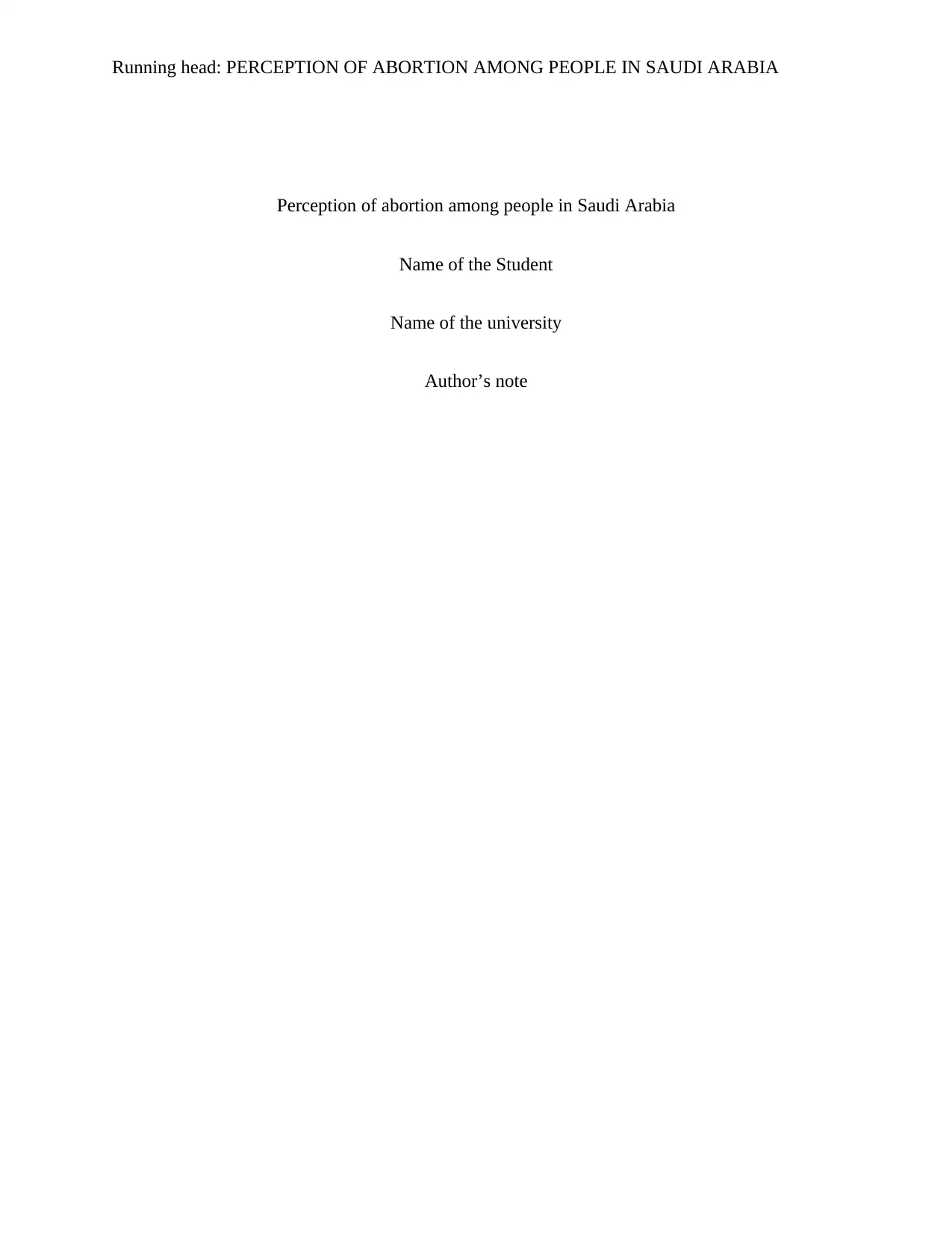
Running head: PERCEPTION OF ABORTION AMONG PEOPLE IN SAUDI ARABIA
Perception of abortion among people in Saudi Arabia
Name of the Student
Name of the university
Author’s note
Perception of abortion among people in Saudi Arabia
Name of the Student
Name of the university
Author’s note
Paraphrase This Document
Need a fresh take? Get an instant paraphrase of this document with our AI Paraphraser
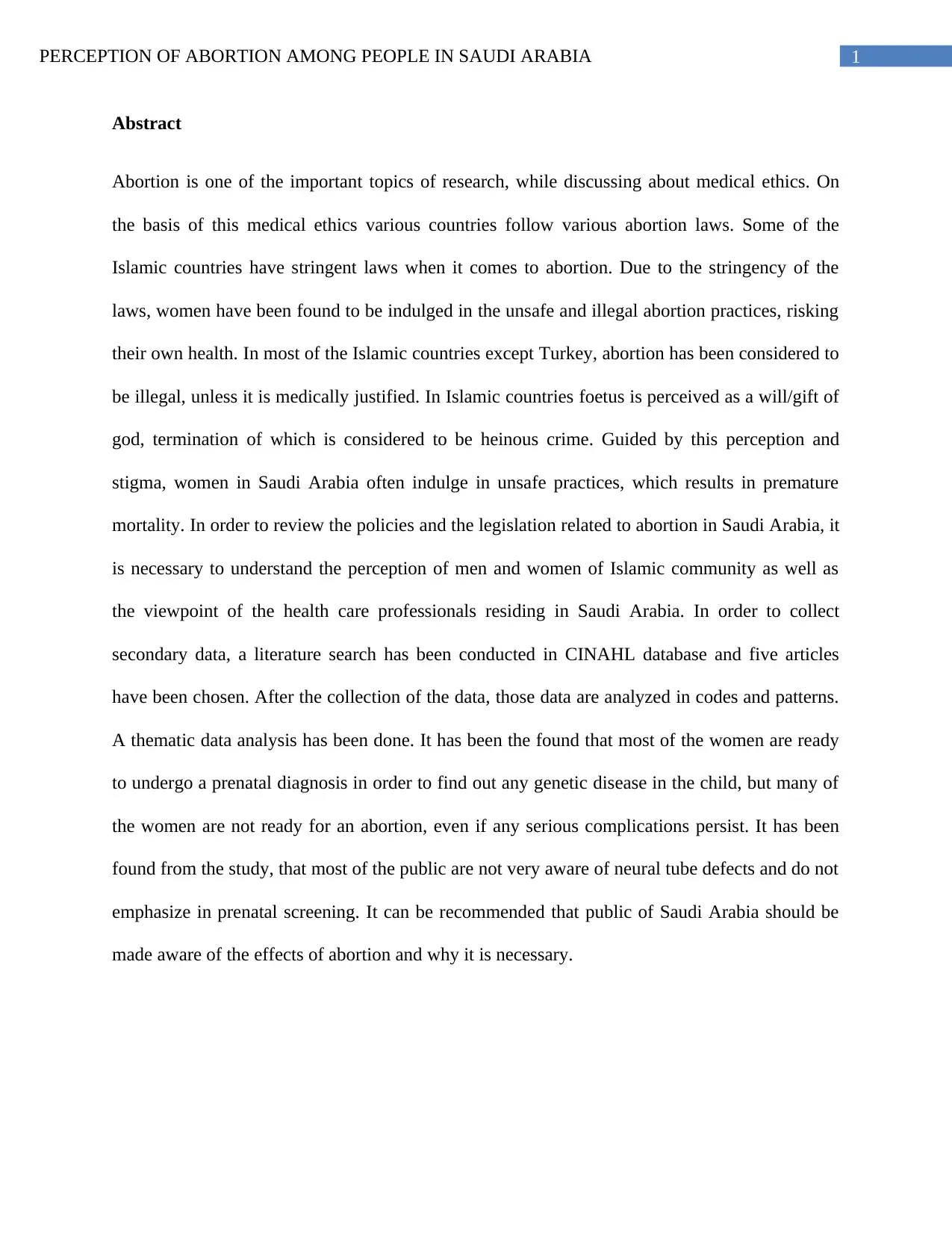
1PERCEPTION OF ABORTION AMONG PEOPLE IN SAUDI ARABIA
Abstract
Abortion is one of the important topics of research, while discussing about medical ethics. On
the basis of this medical ethics various countries follow various abortion laws. Some of the
Islamic countries have stringent laws when it comes to abortion. Due to the stringency of the
laws, women have been found to be indulged in the unsafe and illegal abortion practices, risking
their own health. In most of the Islamic countries except Turkey, abortion has been considered to
be illegal, unless it is medically justified. In Islamic countries foetus is perceived as a will/gift of
god, termination of which is considered to be heinous crime. Guided by this perception and
stigma, women in Saudi Arabia often indulge in unsafe practices, which results in premature
mortality. In order to review the policies and the legislation related to abortion in Saudi Arabia, it
is necessary to understand the perception of men and women of Islamic community as well as
the viewpoint of the health care professionals residing in Saudi Arabia. In order to collect
secondary data, a literature search has been conducted in CINAHL database and five articles
have been chosen. After the collection of the data, those data are analyzed in codes and patterns.
A thematic data analysis has been done. It has been the found that most of the women are ready
to undergo a prenatal diagnosis in order to find out any genetic disease in the child, but many of
the women are not ready for an abortion, even if any serious complications persist. It has been
found from the study, that most of the public are not very aware of neural tube defects and do not
emphasize in prenatal screening. It can be recommended that public of Saudi Arabia should be
made aware of the effects of abortion and why it is necessary.
Abstract
Abortion is one of the important topics of research, while discussing about medical ethics. On
the basis of this medical ethics various countries follow various abortion laws. Some of the
Islamic countries have stringent laws when it comes to abortion. Due to the stringency of the
laws, women have been found to be indulged in the unsafe and illegal abortion practices, risking
their own health. In most of the Islamic countries except Turkey, abortion has been considered to
be illegal, unless it is medically justified. In Islamic countries foetus is perceived as a will/gift of
god, termination of which is considered to be heinous crime. Guided by this perception and
stigma, women in Saudi Arabia often indulge in unsafe practices, which results in premature
mortality. In order to review the policies and the legislation related to abortion in Saudi Arabia, it
is necessary to understand the perception of men and women of Islamic community as well as
the viewpoint of the health care professionals residing in Saudi Arabia. In order to collect
secondary data, a literature search has been conducted in CINAHL database and five articles
have been chosen. After the collection of the data, those data are analyzed in codes and patterns.
A thematic data analysis has been done. It has been the found that most of the women are ready
to undergo a prenatal diagnosis in order to find out any genetic disease in the child, but many of
the women are not ready for an abortion, even if any serious complications persist. It has been
found from the study, that most of the public are not very aware of neural tube defects and do not
emphasize in prenatal screening. It can be recommended that public of Saudi Arabia should be
made aware of the effects of abortion and why it is necessary.
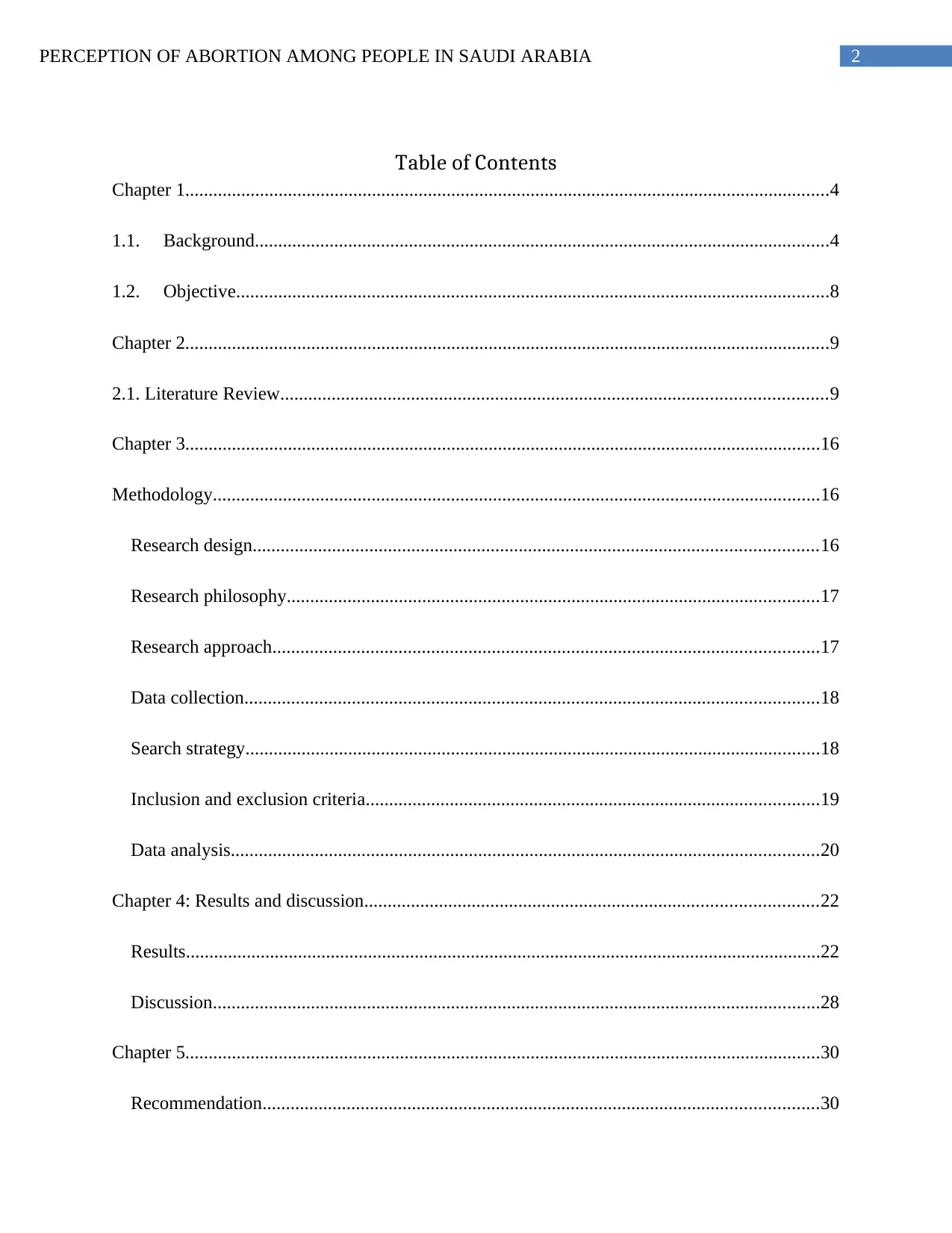
2PERCEPTION OF ABORTION AMONG PEOPLE IN SAUDI ARABIA
Table of Contents
Chapter 1..........................................................................................................................................4
1.1. Background...........................................................................................................................4
1.2. Objective...............................................................................................................................8
Chapter 2..........................................................................................................................................9
2.1. Literature Review.....................................................................................................................9
Chapter 3........................................................................................................................................16
Methodology..................................................................................................................................16
Research design.........................................................................................................................16
Research philosophy..................................................................................................................17
Research approach.....................................................................................................................17
Data collection...........................................................................................................................18
Search strategy...........................................................................................................................18
Inclusion and exclusion criteria.................................................................................................19
Data analysis..............................................................................................................................20
Chapter 4: Results and discussion.................................................................................................22
Results........................................................................................................................................22
Discussion..................................................................................................................................28
Chapter 5........................................................................................................................................30
Recommendation.......................................................................................................................30
Table of Contents
Chapter 1..........................................................................................................................................4
1.1. Background...........................................................................................................................4
1.2. Objective...............................................................................................................................8
Chapter 2..........................................................................................................................................9
2.1. Literature Review.....................................................................................................................9
Chapter 3........................................................................................................................................16
Methodology..................................................................................................................................16
Research design.........................................................................................................................16
Research philosophy..................................................................................................................17
Research approach.....................................................................................................................17
Data collection...........................................................................................................................18
Search strategy...........................................................................................................................18
Inclusion and exclusion criteria.................................................................................................19
Data analysis..............................................................................................................................20
Chapter 4: Results and discussion.................................................................................................22
Results........................................................................................................................................22
Discussion..................................................................................................................................28
Chapter 5........................................................................................................................................30
Recommendation.......................................................................................................................30
⊘ This is a preview!⊘
Do you want full access?
Subscribe today to unlock all pages.

Trusted by 1+ million students worldwide

3PERCEPTION OF ABORTION AMONG PEOPLE IN SAUDI ARABIA
Conclusion.................................................................................................................................31
Study Limitation........................................................................................................................32
Appendix (PRISMA).....................................................................................................................33
Conclusion.................................................................................................................................31
Study Limitation........................................................................................................................32
Appendix (PRISMA).....................................................................................................................33
Paraphrase This Document
Need a fresh take? Get an instant paraphrase of this document with our AI Paraphraser
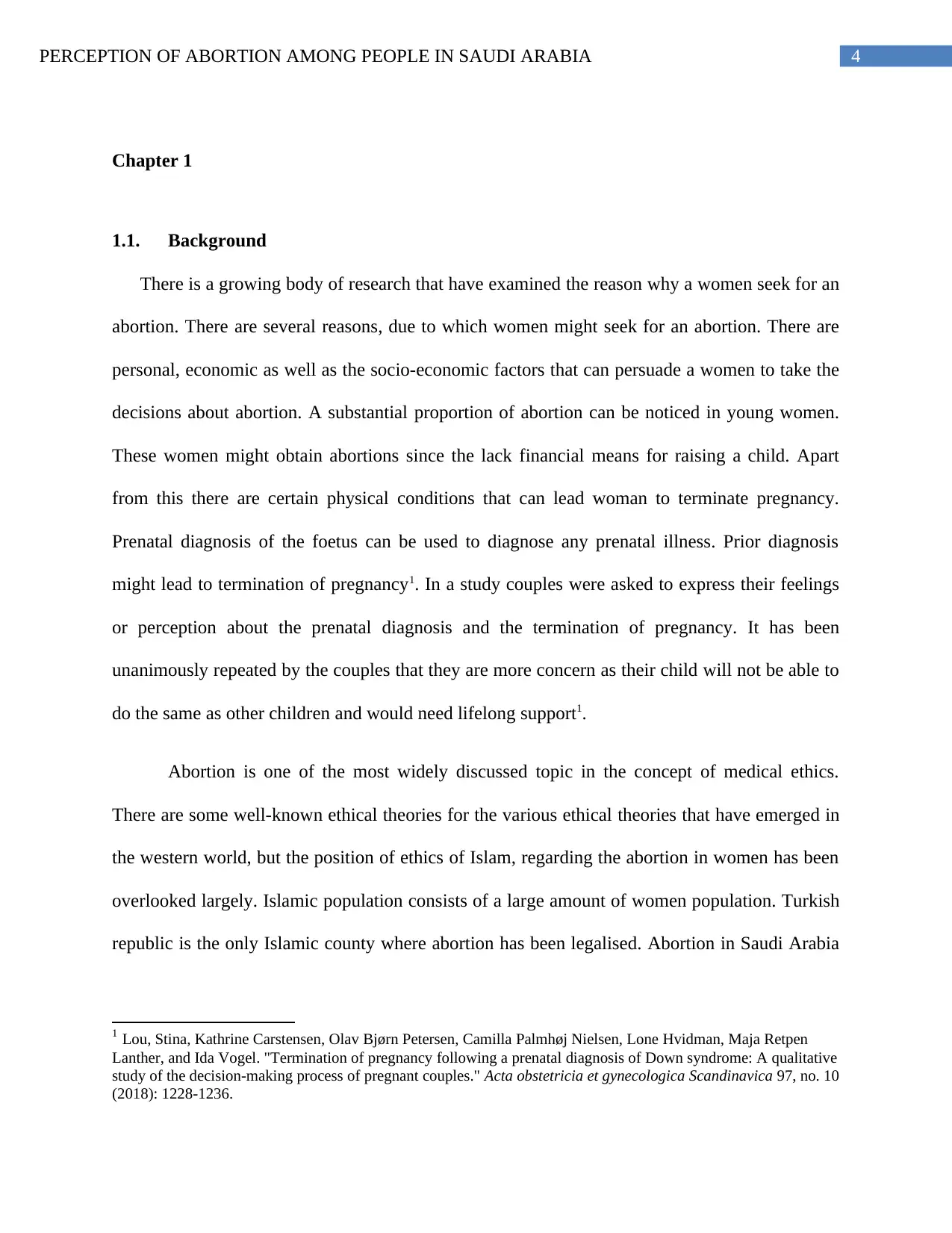
4PERCEPTION OF ABORTION AMONG PEOPLE IN SAUDI ARABIA
Chapter 1
1.1. Background
There is a growing body of research that have examined the reason why a women seek for an
abortion. There are several reasons, due to which women might seek for an abortion. There are
personal, economic as well as the socio-economic factors that can persuade a women to take the
decisions about abortion. A substantial proportion of abortion can be noticed in young women.
These women might obtain abortions since the lack financial means for raising a child. Apart
from this there are certain physical conditions that can lead woman to terminate pregnancy.
Prenatal diagnosis of the foetus can be used to diagnose any prenatal illness. Prior diagnosis
might lead to termination of pregnancy1. In a study couples were asked to express their feelings
or perception about the prenatal diagnosis and the termination of pregnancy. It has been
unanimously repeated by the couples that they are more concern as their child will not be able to
do the same as other children and would need lifelong support1.
Abortion is one of the most widely discussed topic in the concept of medical ethics.
There are some well-known ethical theories for the various ethical theories that have emerged in
the western world, but the position of ethics of Islam, regarding the abortion in women has been
overlooked largely. Islamic population consists of a large amount of women population. Turkish
republic is the only Islamic county where abortion has been legalised. Abortion in Saudi Arabia
1 Lou, Stina, Kathrine Carstensen, Olav Bjørn Petersen, Camilla Palmhøj Nielsen, Lone Hvidman, Maja Retpen
Lanther, and Ida Vogel. "Termination of pregnancy following a prenatal diagnosis of Down syndrome: A qualitative
study of the decision‐making process of pregnant couples." Acta obstetricia et gynecologica Scandinavica 97, no. 10
(2018): 1228-1236.
Chapter 1
1.1. Background
There is a growing body of research that have examined the reason why a women seek for an
abortion. There are several reasons, due to which women might seek for an abortion. There are
personal, economic as well as the socio-economic factors that can persuade a women to take the
decisions about abortion. A substantial proportion of abortion can be noticed in young women.
These women might obtain abortions since the lack financial means for raising a child. Apart
from this there are certain physical conditions that can lead woman to terminate pregnancy.
Prenatal diagnosis of the foetus can be used to diagnose any prenatal illness. Prior diagnosis
might lead to termination of pregnancy1. In a study couples were asked to express their feelings
or perception about the prenatal diagnosis and the termination of pregnancy. It has been
unanimously repeated by the couples that they are more concern as their child will not be able to
do the same as other children and would need lifelong support1.
Abortion is one of the most widely discussed topic in the concept of medical ethics.
There are some well-known ethical theories for the various ethical theories that have emerged in
the western world, but the position of ethics of Islam, regarding the abortion in women has been
overlooked largely. Islamic population consists of a large amount of women population. Turkish
republic is the only Islamic county where abortion has been legalised. Abortion in Saudi Arabia
1 Lou, Stina, Kathrine Carstensen, Olav Bjørn Petersen, Camilla Palmhøj Nielsen, Lone Hvidman, Maja Retpen
Lanther, and Ida Vogel. "Termination of pregnancy following a prenatal diagnosis of Down syndrome: A qualitative
study of the decision‐making process of pregnant couples." Acta obstetricia et gynecologica Scandinavica 97, no. 10
(2018): 1228-1236.
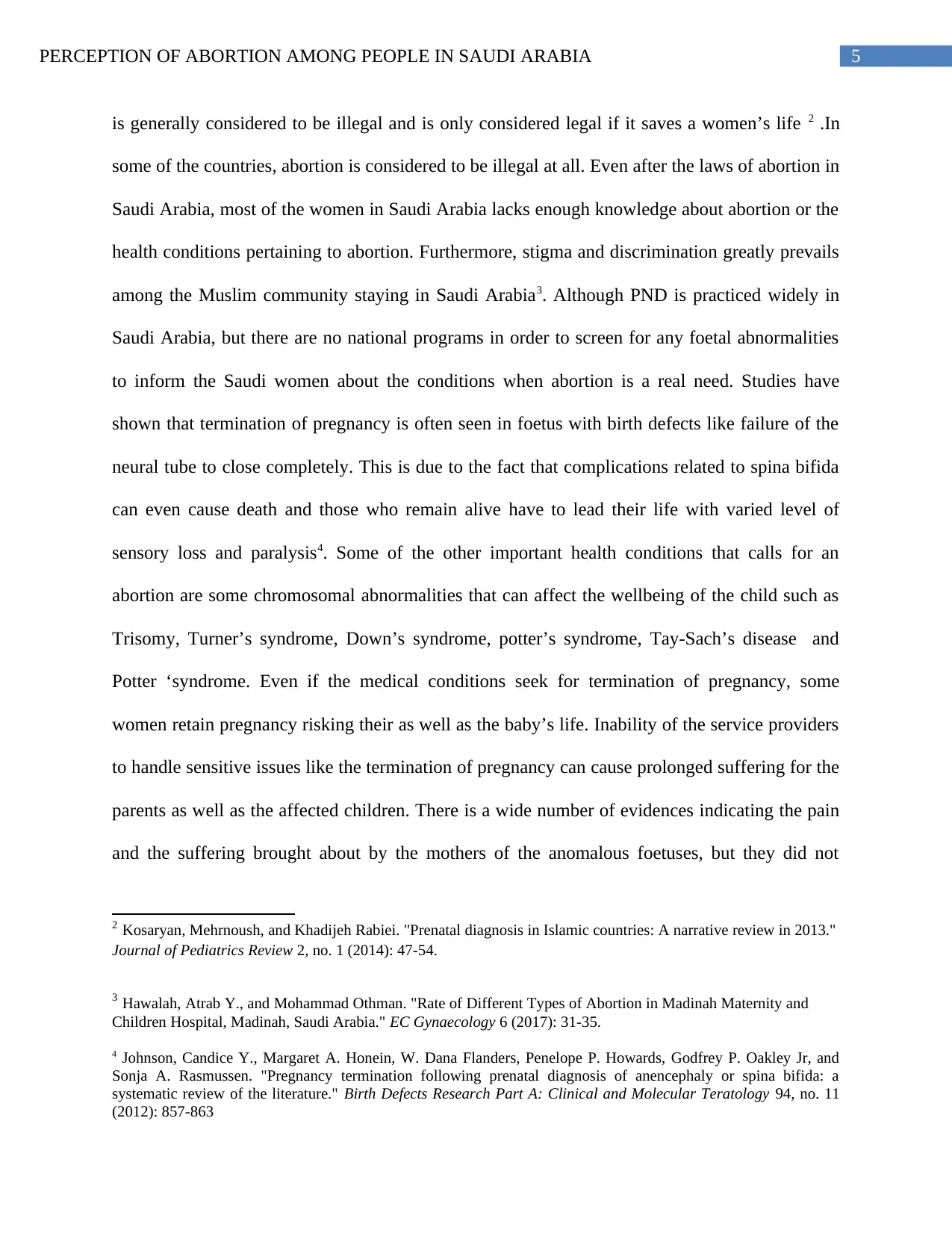
5PERCEPTION OF ABORTION AMONG PEOPLE IN SAUDI ARABIA
is generally considered to be illegal and is only considered legal if it saves a women’s life 2 .In
some of the countries, abortion is considered to be illegal at all. Even after the laws of abortion in
Saudi Arabia, most of the women in Saudi Arabia lacks enough knowledge about abortion or the
health conditions pertaining to abortion. Furthermore, stigma and discrimination greatly prevails
among the Muslim community staying in Saudi Arabia3. Although PND is practiced widely in
Saudi Arabia, but there are no national programs in order to screen for any foetal abnormalities
to inform the Saudi women about the conditions when abortion is a real need. Studies have
shown that termination of pregnancy is often seen in foetus with birth defects like failure of the
neural tube to close completely. This is due to the fact that complications related to spina bifida
can even cause death and those who remain alive have to lead their life with varied level of
sensory loss and paralysis4. Some of the other important health conditions that calls for an
abortion are some chromosomal abnormalities that can affect the wellbeing of the child such as
Trisomy, Turner’s syndrome, Down’s syndrome, potter’s syndrome, Tay-Sach’s disease and
Potter ‘syndrome. Even if the medical conditions seek for termination of pregnancy, some
women retain pregnancy risking their as well as the baby’s life. Inability of the service providers
to handle sensitive issues like the termination of pregnancy can cause prolonged suffering for the
parents as well as the affected children. There is a wide number of evidences indicating the pain
and the suffering brought about by the mothers of the anomalous foetuses, but they did not
2 Kosaryan, Mehrnoush, and Khadijeh Rabiei. "Prenatal diagnosis in Islamic countries: A narrative review in 2013."
Journal of Pediatrics Review 2, no. 1 (2014): 47-54.
3 Hawalah, Atrab Y., and Mohammad Othman. "Rate of Different Types of Abortion in Madinah Maternity and
Children Hospital, Madinah, Saudi Arabia." EC Gynaecology 6 (2017): 31-35.
4 Johnson, Candice Y., Margaret A. Honein, W. Dana Flanders, Penelope P. Howards, Godfrey P. Oakley Jr, and
Sonja A. Rasmussen. "Pregnancy termination following prenatal diagnosis of anencephaly or spina bifida: a
systematic review of the literature." Birth Defects Research Part A: Clinical and Molecular Teratology 94, no. 11
(2012): 857-863
is generally considered to be illegal and is only considered legal if it saves a women’s life 2 .In
some of the countries, abortion is considered to be illegal at all. Even after the laws of abortion in
Saudi Arabia, most of the women in Saudi Arabia lacks enough knowledge about abortion or the
health conditions pertaining to abortion. Furthermore, stigma and discrimination greatly prevails
among the Muslim community staying in Saudi Arabia3. Although PND is practiced widely in
Saudi Arabia, but there are no national programs in order to screen for any foetal abnormalities
to inform the Saudi women about the conditions when abortion is a real need. Studies have
shown that termination of pregnancy is often seen in foetus with birth defects like failure of the
neural tube to close completely. This is due to the fact that complications related to spina bifida
can even cause death and those who remain alive have to lead their life with varied level of
sensory loss and paralysis4. Some of the other important health conditions that calls for an
abortion are some chromosomal abnormalities that can affect the wellbeing of the child such as
Trisomy, Turner’s syndrome, Down’s syndrome, potter’s syndrome, Tay-Sach’s disease and
Potter ‘syndrome. Even if the medical conditions seek for termination of pregnancy, some
women retain pregnancy risking their as well as the baby’s life. Inability of the service providers
to handle sensitive issues like the termination of pregnancy can cause prolonged suffering for the
parents as well as the affected children. There is a wide number of evidences indicating the pain
and the suffering brought about by the mothers of the anomalous foetuses, but they did not
2 Kosaryan, Mehrnoush, and Khadijeh Rabiei. "Prenatal diagnosis in Islamic countries: A narrative review in 2013."
Journal of Pediatrics Review 2, no. 1 (2014): 47-54.
3 Hawalah, Atrab Y., and Mohammad Othman. "Rate of Different Types of Abortion in Madinah Maternity and
Children Hospital, Madinah, Saudi Arabia." EC Gynaecology 6 (2017): 31-35.
4 Johnson, Candice Y., Margaret A. Honein, W. Dana Flanders, Penelope P. Howards, Godfrey P. Oakley Jr, and
Sonja A. Rasmussen. "Pregnancy termination following prenatal diagnosis of anencephaly or spina bifida: a
systematic review of the literature." Birth Defects Research Part A: Clinical and Molecular Teratology 94, no. 11
(2012): 857-863
⊘ This is a preview!⊘
Do you want full access?
Subscribe today to unlock all pages.

Trusted by 1+ million students worldwide
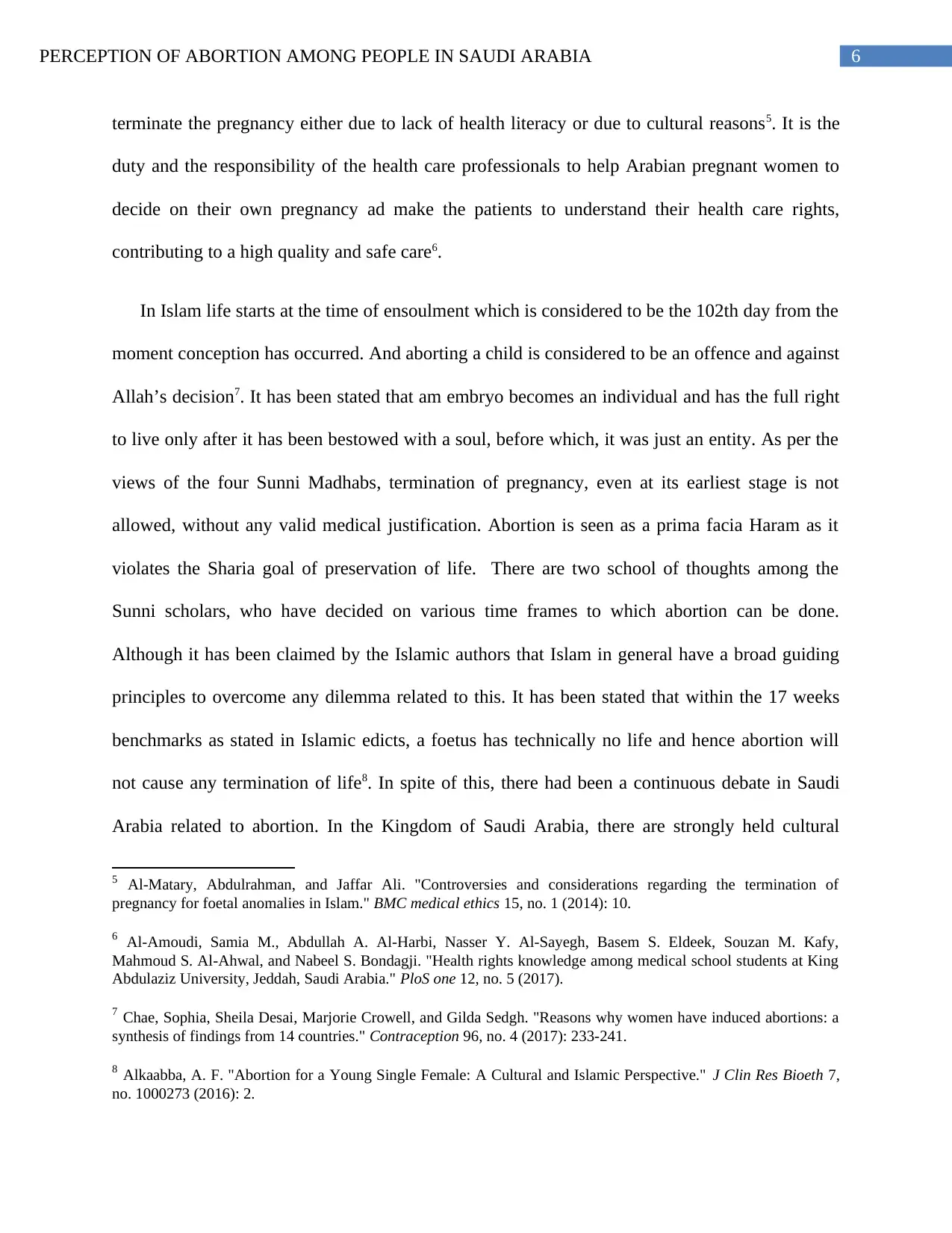
6PERCEPTION OF ABORTION AMONG PEOPLE IN SAUDI ARABIA
terminate the pregnancy either due to lack of health literacy or due to cultural reasons5. It is the
duty and the responsibility of the health care professionals to help Arabian pregnant women to
decide on their own pregnancy ad make the patients to understand their health care rights,
contributing to a high quality and safe care6.
In Islam life starts at the time of ensoulment which is considered to be the 102th day from the
moment conception has occurred. And aborting a child is considered to be an offence and against
Allah’s decision7. It has been stated that am embryo becomes an individual and has the full right
to live only after it has been bestowed with a soul, before which, it was just an entity. As per the
views of the four Sunni Madhabs, termination of pregnancy, even at its earliest stage is not
allowed, without any valid medical justification. Abortion is seen as a prima facia Haram as it
violates the Sharia goal of preservation of life. There are two school of thoughts among the
Sunni scholars, who have decided on various time frames to which abortion can be done.
Although it has been claimed by the Islamic authors that Islam in general have a broad guiding
principles to overcome any dilemma related to this. It has been stated that within the 17 weeks
benchmarks as stated in Islamic edicts, a foetus has technically no life and hence abortion will
not cause any termination of life8. In spite of this, there had been a continuous debate in Saudi
Arabia related to abortion. In the Kingdom of Saudi Arabia, there are strongly held cultural
5 Al-Matary, Abdulrahman, and Jaffar Ali. "Controversies and considerations regarding the termination of
pregnancy for foetal anomalies in Islam." BMC medical ethics 15, no. 1 (2014): 10.
6 Al-Amoudi, Samia M., Abdullah A. Al-Harbi, Nasser Y. Al-Sayegh, Basem S. Eldeek, Souzan M. Kafy,
Mahmoud S. Al-Ahwal, and Nabeel S. Bondagji. "Health rights knowledge among medical school students at King
Abdulaziz University, Jeddah, Saudi Arabia." PloS one 12, no. 5 (2017).
7 Chae, Sophia, Sheila Desai, Marjorie Crowell, and Gilda Sedgh. "Reasons why women have induced abortions: a
synthesis of findings from 14 countries." Contraception 96, no. 4 (2017): 233-241.
8 Alkaabba, A. F. "Abortion for a Young Single Female: A Cultural and Islamic Perspective." J Clin Res Bioeth 7,
no. 1000273 (2016): 2.
terminate the pregnancy either due to lack of health literacy or due to cultural reasons5. It is the
duty and the responsibility of the health care professionals to help Arabian pregnant women to
decide on their own pregnancy ad make the patients to understand their health care rights,
contributing to a high quality and safe care6.
In Islam life starts at the time of ensoulment which is considered to be the 102th day from the
moment conception has occurred. And aborting a child is considered to be an offence and against
Allah’s decision7. It has been stated that am embryo becomes an individual and has the full right
to live only after it has been bestowed with a soul, before which, it was just an entity. As per the
views of the four Sunni Madhabs, termination of pregnancy, even at its earliest stage is not
allowed, without any valid medical justification. Abortion is seen as a prima facia Haram as it
violates the Sharia goal of preservation of life. There are two school of thoughts among the
Sunni scholars, who have decided on various time frames to which abortion can be done.
Although it has been claimed by the Islamic authors that Islam in general have a broad guiding
principles to overcome any dilemma related to this. It has been stated that within the 17 weeks
benchmarks as stated in Islamic edicts, a foetus has technically no life and hence abortion will
not cause any termination of life8. In spite of this, there had been a continuous debate in Saudi
Arabia related to abortion. In the Kingdom of Saudi Arabia, there are strongly held cultural
5 Al-Matary, Abdulrahman, and Jaffar Ali. "Controversies and considerations regarding the termination of
pregnancy for foetal anomalies in Islam." BMC medical ethics 15, no. 1 (2014): 10.
6 Al-Amoudi, Samia M., Abdullah A. Al-Harbi, Nasser Y. Al-Sayegh, Basem S. Eldeek, Souzan M. Kafy,
Mahmoud S. Al-Ahwal, and Nabeel S. Bondagji. "Health rights knowledge among medical school students at King
Abdulaziz University, Jeddah, Saudi Arabia." PloS one 12, no. 5 (2017).
7 Chae, Sophia, Sheila Desai, Marjorie Crowell, and Gilda Sedgh. "Reasons why women have induced abortions: a
synthesis of findings from 14 countries." Contraception 96, no. 4 (2017): 233-241.
8 Alkaabba, A. F. "Abortion for a Young Single Female: A Cultural and Islamic Perspective." J Clin Res Bioeth 7,
no. 1000273 (2016): 2.
Paraphrase This Document
Need a fresh take? Get an instant paraphrase of this document with our AI Paraphraser
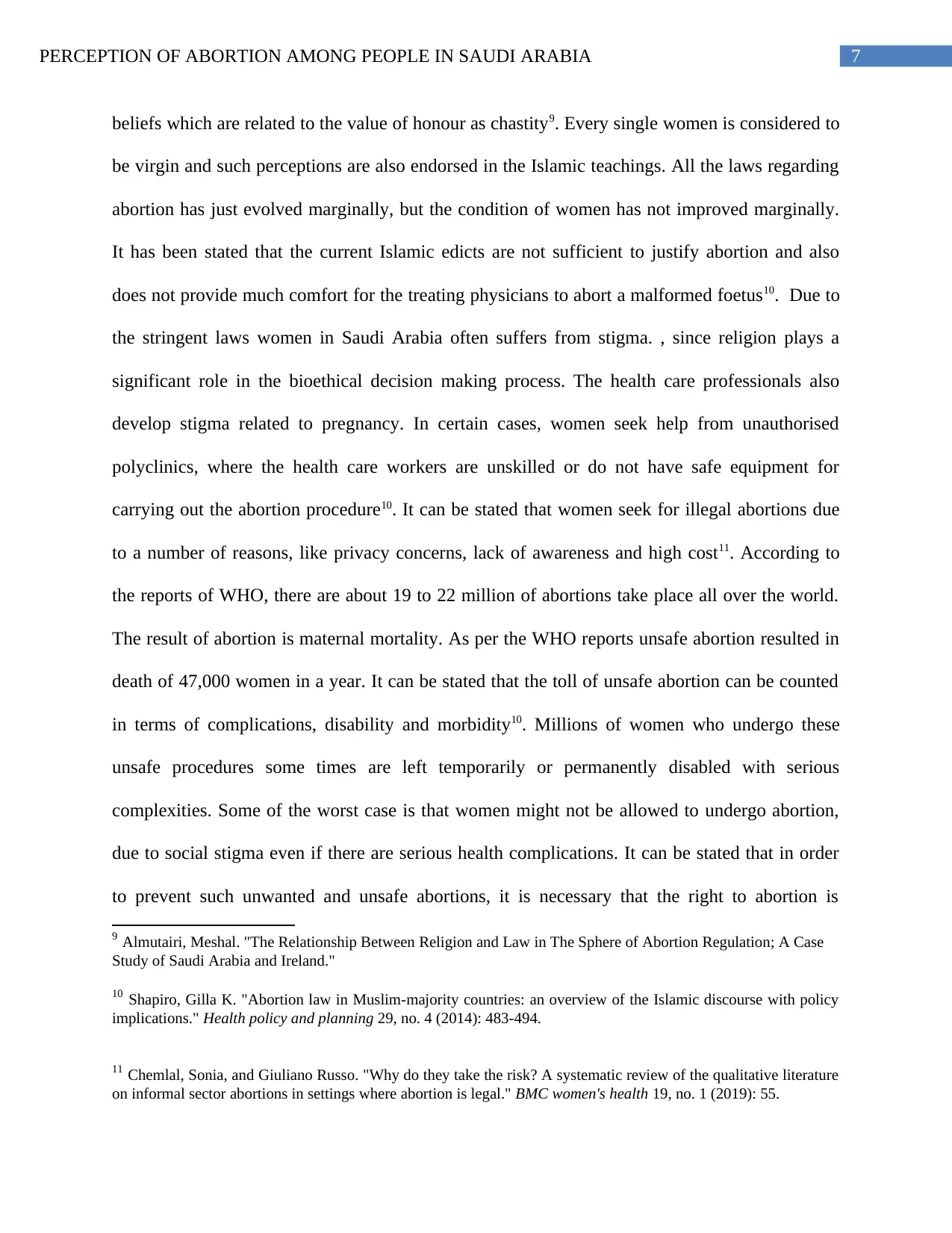
7PERCEPTION OF ABORTION AMONG PEOPLE IN SAUDI ARABIA
beliefs which are related to the value of honour as chastity9. Every single women is considered to
be virgin and such perceptions are also endorsed in the Islamic teachings. All the laws regarding
abortion has just evolved marginally, but the condition of women has not improved marginally.
It has been stated that the current Islamic edicts are not sufficient to justify abortion and also
does not provide much comfort for the treating physicians to abort a malformed foetus10. Due to
the stringent laws women in Saudi Arabia often suffers from stigma. , since religion plays a
significant role in the bioethical decision making process. The health care professionals also
develop stigma related to pregnancy. In certain cases, women seek help from unauthorised
polyclinics, where the health care workers are unskilled or do not have safe equipment for
carrying out the abortion procedure10. It can be stated that women seek for illegal abortions due
to a number of reasons, like privacy concerns, lack of awareness and high cost11. According to
the reports of WHO, there are about 19 to 22 million of abortions take place all over the world.
The result of abortion is maternal mortality. As per the WHO reports unsafe abortion resulted in
death of 47,000 women in a year. It can be stated that the toll of unsafe abortion can be counted
in terms of complications, disability and morbidity10. Millions of women who undergo these
unsafe procedures some times are left temporarily or permanently disabled with serious
complexities. Some of the worst case is that women might not be allowed to undergo abortion,
due to social stigma even if there are serious health complications. It can be stated that in order
to prevent such unwanted and unsafe abortions, it is necessary that the right to abortion is
9 Almutairi, Meshal. "The Relationship Between Religion and Law in The Sphere of Abortion Regulation; A Case
Study of Saudi Arabia and Ireland."
10 Shapiro, Gilla K. "Abortion law in Muslim-majority countries: an overview of the Islamic discourse with policy
implications." Health policy and planning 29, no. 4 (2014): 483-494.
11 Chemlal, Sonia, and Giuliano Russo. "Why do they take the risk? A systematic review of the qualitative literature
on informal sector abortions in settings where abortion is legal." BMC women's health 19, no. 1 (2019): 55.
beliefs which are related to the value of honour as chastity9. Every single women is considered to
be virgin and such perceptions are also endorsed in the Islamic teachings. All the laws regarding
abortion has just evolved marginally, but the condition of women has not improved marginally.
It has been stated that the current Islamic edicts are not sufficient to justify abortion and also
does not provide much comfort for the treating physicians to abort a malformed foetus10. Due to
the stringent laws women in Saudi Arabia often suffers from stigma. , since religion plays a
significant role in the bioethical decision making process. The health care professionals also
develop stigma related to pregnancy. In certain cases, women seek help from unauthorised
polyclinics, where the health care workers are unskilled or do not have safe equipment for
carrying out the abortion procedure10. It can be stated that women seek for illegal abortions due
to a number of reasons, like privacy concerns, lack of awareness and high cost11. According to
the reports of WHO, there are about 19 to 22 million of abortions take place all over the world.
The result of abortion is maternal mortality. As per the WHO reports unsafe abortion resulted in
death of 47,000 women in a year. It can be stated that the toll of unsafe abortion can be counted
in terms of complications, disability and morbidity10. Millions of women who undergo these
unsafe procedures some times are left temporarily or permanently disabled with serious
complexities. Some of the worst case is that women might not be allowed to undergo abortion,
due to social stigma even if there are serious health complications. It can be stated that in order
to prevent such unwanted and unsafe abortions, it is necessary that the right to abortion is
9 Almutairi, Meshal. "The Relationship Between Religion and Law in The Sphere of Abortion Regulation; A Case
Study of Saudi Arabia and Ireland."
10 Shapiro, Gilla K. "Abortion law in Muslim-majority countries: an overview of the Islamic discourse with policy
implications." Health policy and planning 29, no. 4 (2014): 483-494.
11 Chemlal, Sonia, and Giuliano Russo. "Why do they take the risk? A systematic review of the qualitative literature
on informal sector abortions in settings where abortion is legal." BMC women's health 19, no. 1 (2019): 55.
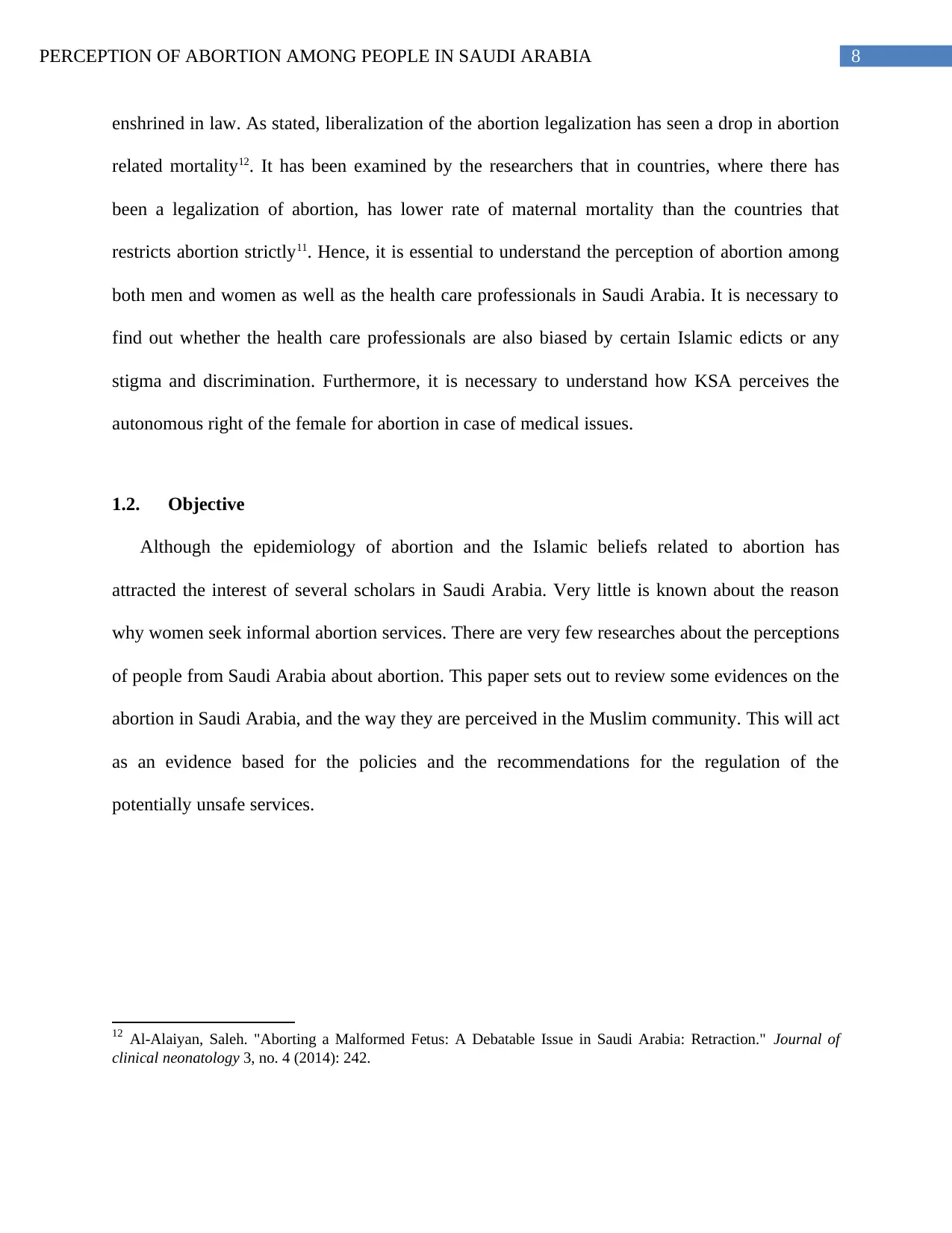
8PERCEPTION OF ABORTION AMONG PEOPLE IN SAUDI ARABIA
enshrined in law. As stated, liberalization of the abortion legalization has seen a drop in abortion
related mortality12. It has been examined by the researchers that in countries, where there has
been a legalization of abortion, has lower rate of maternal mortality than the countries that
restricts abortion strictly11. Hence, it is essential to understand the perception of abortion among
both men and women as well as the health care professionals in Saudi Arabia. It is necessary to
find out whether the health care professionals are also biased by certain Islamic edicts or any
stigma and discrimination. Furthermore, it is necessary to understand how KSA perceives the
autonomous right of the female for abortion in case of medical issues.
1.2. Objective
Although the epidemiology of abortion and the Islamic beliefs related to abortion has
attracted the interest of several scholars in Saudi Arabia. Very little is known about the reason
why women seek informal abortion services. There are very few researches about the perceptions
of people from Saudi Arabia about abortion. This paper sets out to review some evidences on the
abortion in Saudi Arabia, and the way they are perceived in the Muslim community. This will act
as an evidence based for the policies and the recommendations for the regulation of the
potentially unsafe services.
12 Al-Alaiyan, Saleh. "Aborting a Malformed Fetus: A Debatable Issue in Saudi Arabia: Retraction." Journal of
clinical neonatology 3, no. 4 (2014): 242.
enshrined in law. As stated, liberalization of the abortion legalization has seen a drop in abortion
related mortality12. It has been examined by the researchers that in countries, where there has
been a legalization of abortion, has lower rate of maternal mortality than the countries that
restricts abortion strictly11. Hence, it is essential to understand the perception of abortion among
both men and women as well as the health care professionals in Saudi Arabia. It is necessary to
find out whether the health care professionals are also biased by certain Islamic edicts or any
stigma and discrimination. Furthermore, it is necessary to understand how KSA perceives the
autonomous right of the female for abortion in case of medical issues.
1.2. Objective
Although the epidemiology of abortion and the Islamic beliefs related to abortion has
attracted the interest of several scholars in Saudi Arabia. Very little is known about the reason
why women seek informal abortion services. There are very few researches about the perceptions
of people from Saudi Arabia about abortion. This paper sets out to review some evidences on the
abortion in Saudi Arabia, and the way they are perceived in the Muslim community. This will act
as an evidence based for the policies and the recommendations for the regulation of the
potentially unsafe services.
12 Al-Alaiyan, Saleh. "Aborting a Malformed Fetus: A Debatable Issue in Saudi Arabia: Retraction." Journal of
clinical neonatology 3, no. 4 (2014): 242.
⊘ This is a preview!⊘
Do you want full access?
Subscribe today to unlock all pages.

Trusted by 1+ million students worldwide
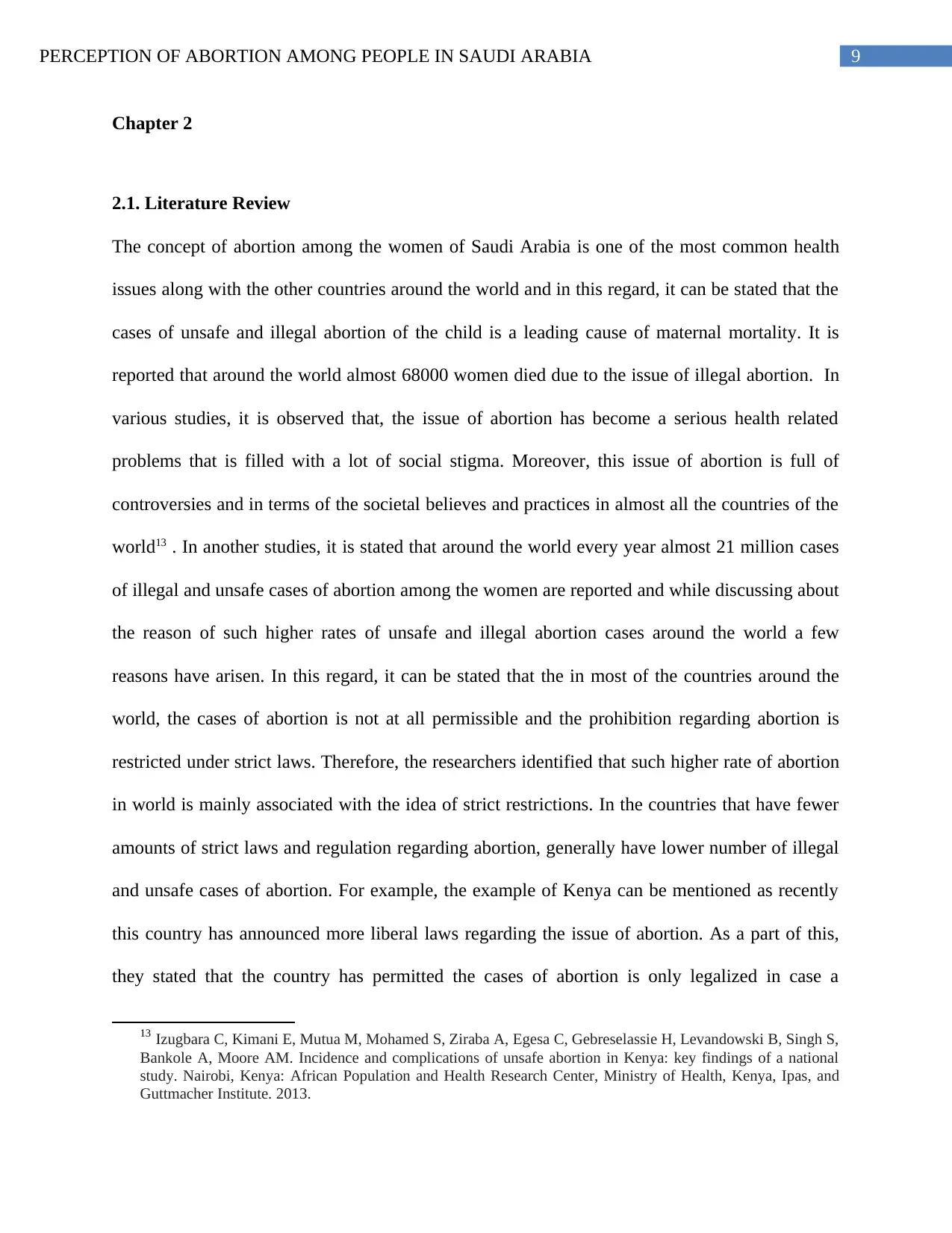
9PERCEPTION OF ABORTION AMONG PEOPLE IN SAUDI ARABIA
Chapter 2
2.1. Literature Review
The concept of abortion among the women of Saudi Arabia is one of the most common health
issues along with the other countries around the world and in this regard, it can be stated that the
cases of unsafe and illegal abortion of the child is a leading cause of maternal mortality. It is
reported that around the world almost 68000 women died due to the issue of illegal abortion. In
various studies, it is observed that, the issue of abortion has become a serious health related
problems that is filled with a lot of social stigma. Moreover, this issue of abortion is full of
controversies and in terms of the societal believes and practices in almost all the countries of the
world13 . In another studies, it is stated that around the world every year almost 21 million cases
of illegal and unsafe cases of abortion among the women are reported and while discussing about
the reason of such higher rates of unsafe and illegal abortion cases around the world a few
reasons have arisen. In this regard, it can be stated that the in most of the countries around the
world, the cases of abortion is not at all permissible and the prohibition regarding abortion is
restricted under strict laws. Therefore, the researchers identified that such higher rate of abortion
in world is mainly associated with the idea of strict restrictions. In the countries that have fewer
amounts of strict laws and regulation regarding abortion, generally have lower number of illegal
and unsafe cases of abortion. For example, the example of Kenya can be mentioned as recently
this country has announced more liberal laws regarding the issue of abortion. As a part of this,
they stated that the country has permitted the cases of abortion is only legalized in case a
13 Izugbara C, Kimani E, Mutua M, Mohamed S, Ziraba A, Egesa C, Gebreselassie H, Levandowski B, Singh S,
Bankole A, Moore AM. Incidence and complications of unsafe abortion in Kenya: key findings of a national
study. Nairobi, Kenya: African Population and Health Research Center, Ministry of Health, Kenya, Ipas, and
Guttmacher Institute. 2013.
Chapter 2
2.1. Literature Review
The concept of abortion among the women of Saudi Arabia is one of the most common health
issues along with the other countries around the world and in this regard, it can be stated that the
cases of unsafe and illegal abortion of the child is a leading cause of maternal mortality. It is
reported that around the world almost 68000 women died due to the issue of illegal abortion. In
various studies, it is observed that, the issue of abortion has become a serious health related
problems that is filled with a lot of social stigma. Moreover, this issue of abortion is full of
controversies and in terms of the societal believes and practices in almost all the countries of the
world13 . In another studies, it is stated that around the world every year almost 21 million cases
of illegal and unsafe cases of abortion among the women are reported and while discussing about
the reason of such higher rates of unsafe and illegal abortion cases around the world a few
reasons have arisen. In this regard, it can be stated that the in most of the countries around the
world, the cases of abortion is not at all permissible and the prohibition regarding abortion is
restricted under strict laws. Therefore, the researchers identified that such higher rate of abortion
in world is mainly associated with the idea of strict restrictions. In the countries that have fewer
amounts of strict laws and regulation regarding abortion, generally have lower number of illegal
and unsafe cases of abortion. For example, the example of Kenya can be mentioned as recently
this country has announced more liberal laws regarding the issue of abortion. As a part of this,
they stated that the country has permitted the cases of abortion is only legalized in case a
13 Izugbara C, Kimani E, Mutua M, Mohamed S, Ziraba A, Egesa C, Gebreselassie H, Levandowski B, Singh S,
Bankole A, Moore AM. Incidence and complications of unsafe abortion in Kenya: key findings of a national
study. Nairobi, Kenya: African Population and Health Research Center, Ministry of Health, Kenya, Ipas, and
Guttmacher Institute. 2013.
Paraphrase This Document
Need a fresh take? Get an instant paraphrase of this document with our AI Paraphraser
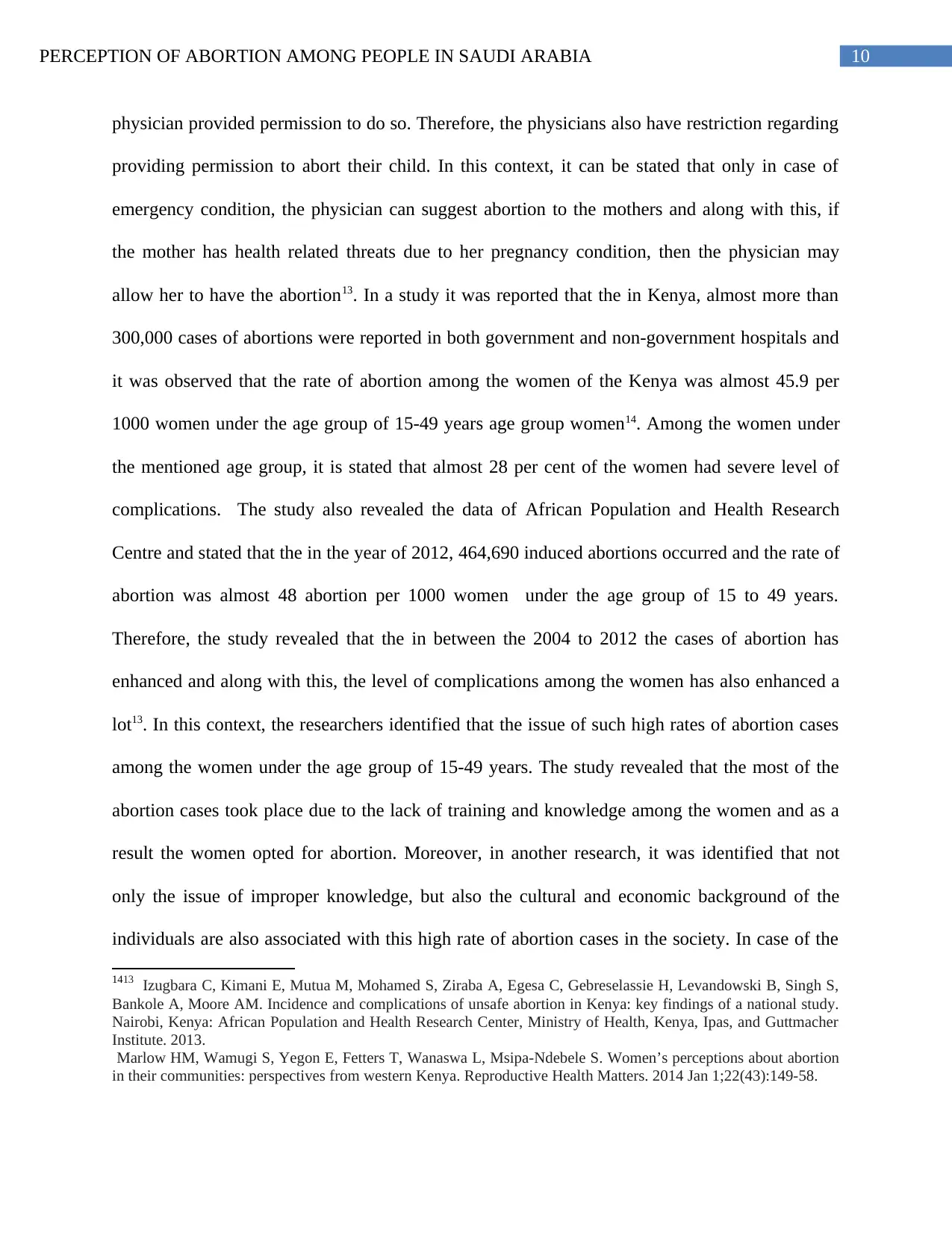
10PERCEPTION OF ABORTION AMONG PEOPLE IN SAUDI ARABIA
physician provided permission to do so. Therefore, the physicians also have restriction regarding
providing permission to abort their child. In this context, it can be stated that only in case of
emergency condition, the physician can suggest abortion to the mothers and along with this, if
the mother has health related threats due to her pregnancy condition, then the physician may
allow her to have the abortion13. In a study it was reported that the in Kenya, almost more than
300,000 cases of abortions were reported in both government and non-government hospitals and
it was observed that the rate of abortion among the women of the Kenya was almost 45.9 per
1000 women under the age group of 15-49 years age group women14. Among the women under
the mentioned age group, it is stated that almost 28 per cent of the women had severe level of
complications. The study also revealed the data of African Population and Health Research
Centre and stated that the in the year of 2012, 464,690 induced abortions occurred and the rate of
abortion was almost 48 abortion per 1000 women under the age group of 15 to 49 years.
Therefore, the study revealed that the in between the 2004 to 2012 the cases of abortion has
enhanced and along with this, the level of complications among the women has also enhanced a
lot13. In this context, the researchers identified that the issue of such high rates of abortion cases
among the women under the age group of 15-49 years. The study revealed that the most of the
abortion cases took place due to the lack of training and knowledge among the women and as a
result the women opted for abortion. Moreover, in another research, it was identified that not
only the issue of improper knowledge, but also the cultural and economic background of the
individuals are also associated with this high rate of abortion cases in the society. In case of the
1413 Izugbara C, Kimani E, Mutua M, Mohamed S, Ziraba A, Egesa C, Gebreselassie H, Levandowski B, Singh S,
Bankole A, Moore AM. Incidence and complications of unsafe abortion in Kenya: key findings of a national study.
Nairobi, Kenya: African Population and Health Research Center, Ministry of Health, Kenya, Ipas, and Guttmacher
Institute. 2013.
Marlow HM, Wamugi S, Yegon E, Fetters T, Wanaswa L, Msipa-Ndebele S. Women’s perceptions about abortion
in their communities: perspectives from western Kenya. Reproductive Health Matters. 2014 Jan 1;22(43):149-58.
physician provided permission to do so. Therefore, the physicians also have restriction regarding
providing permission to abort their child. In this context, it can be stated that only in case of
emergency condition, the physician can suggest abortion to the mothers and along with this, if
the mother has health related threats due to her pregnancy condition, then the physician may
allow her to have the abortion13. In a study it was reported that the in Kenya, almost more than
300,000 cases of abortions were reported in both government and non-government hospitals and
it was observed that the rate of abortion among the women of the Kenya was almost 45.9 per
1000 women under the age group of 15-49 years age group women14. Among the women under
the mentioned age group, it is stated that almost 28 per cent of the women had severe level of
complications. The study also revealed the data of African Population and Health Research
Centre and stated that the in the year of 2012, 464,690 induced abortions occurred and the rate of
abortion was almost 48 abortion per 1000 women under the age group of 15 to 49 years.
Therefore, the study revealed that the in between the 2004 to 2012 the cases of abortion has
enhanced and along with this, the level of complications among the women has also enhanced a
lot13. In this context, the researchers identified that the issue of such high rates of abortion cases
among the women under the age group of 15-49 years. The study revealed that the most of the
abortion cases took place due to the lack of training and knowledge among the women and as a
result the women opted for abortion. Moreover, in another research, it was identified that not
only the issue of improper knowledge, but also the cultural and economic background of the
individuals are also associated with this high rate of abortion cases in the society. In case of the
1413 Izugbara C, Kimani E, Mutua M, Mohamed S, Ziraba A, Egesa C, Gebreselassie H, Levandowski B, Singh S,
Bankole A, Moore AM. Incidence and complications of unsafe abortion in Kenya: key findings of a national study.
Nairobi, Kenya: African Population and Health Research Center, Ministry of Health, Kenya, Ipas, and Guttmacher
Institute. 2013.
Marlow HM, Wamugi S, Yegon E, Fetters T, Wanaswa L, Msipa-Ndebele S. Women’s perceptions about abortion
in their communities: perspectives from western Kenya. Reproductive Health Matters. 2014 Jan 1;22(43):149-58.
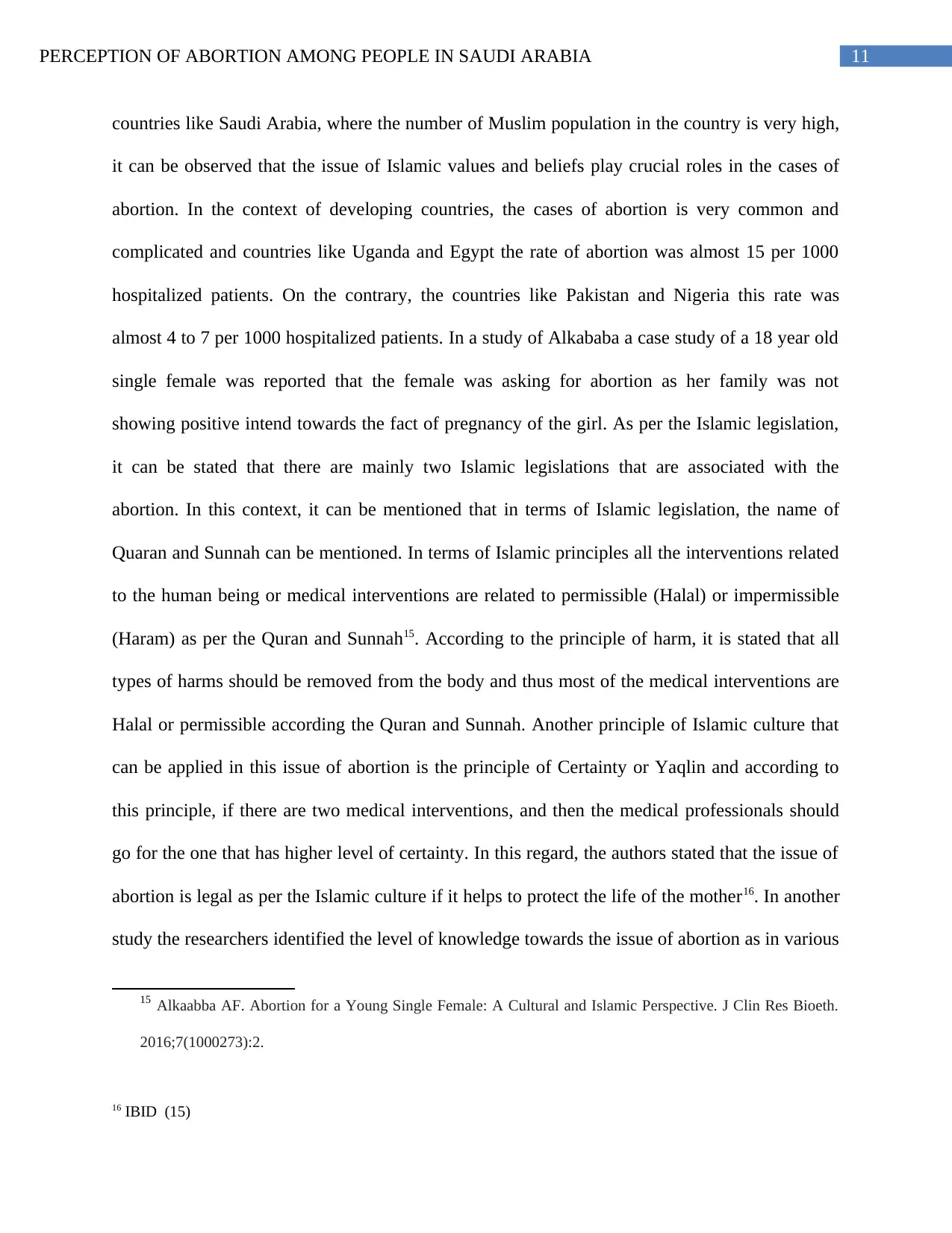
11PERCEPTION OF ABORTION AMONG PEOPLE IN SAUDI ARABIA
countries like Saudi Arabia, where the number of Muslim population in the country is very high,
it can be observed that the issue of Islamic values and beliefs play crucial roles in the cases of
abortion. In the context of developing countries, the cases of abortion is very common and
complicated and countries like Uganda and Egypt the rate of abortion was almost 15 per 1000
hospitalized patients. On the contrary, the countries like Pakistan and Nigeria this rate was
almost 4 to 7 per 1000 hospitalized patients. In a study of Alkababa a case study of a 18 year old
single female was reported that the female was asking for abortion as her family was not
showing positive intend towards the fact of pregnancy of the girl. As per the Islamic legislation,
it can be stated that there are mainly two Islamic legislations that are associated with the
abortion. In this context, it can be mentioned that in terms of Islamic legislation, the name of
Quaran and Sunnah can be mentioned. In terms of Islamic principles all the interventions related
to the human being or medical interventions are related to permissible (Halal) or impermissible
(Haram) as per the Quran and Sunnah15. According to the principle of harm, it is stated that all
types of harms should be removed from the body and thus most of the medical interventions are
Halal or permissible according the Quran and Sunnah. Another principle of Islamic culture that
can be applied in this issue of abortion is the principle of Certainty or Yaqlin and according to
this principle, if there are two medical interventions, and then the medical professionals should
go for the one that has higher level of certainty. In this regard, the authors stated that the issue of
abortion is legal as per the Islamic culture if it helps to protect the life of the mother16. In another
study the researchers identified the level of knowledge towards the issue of abortion as in various
15 Alkaabba AF. Abortion for a Young Single Female: A Cultural and Islamic Perspective. J Clin Res Bioeth.
2016;7(1000273):2.
16 IBID (15)
countries like Saudi Arabia, where the number of Muslim population in the country is very high,
it can be observed that the issue of Islamic values and beliefs play crucial roles in the cases of
abortion. In the context of developing countries, the cases of abortion is very common and
complicated and countries like Uganda and Egypt the rate of abortion was almost 15 per 1000
hospitalized patients. On the contrary, the countries like Pakistan and Nigeria this rate was
almost 4 to 7 per 1000 hospitalized patients. In a study of Alkababa a case study of a 18 year old
single female was reported that the female was asking for abortion as her family was not
showing positive intend towards the fact of pregnancy of the girl. As per the Islamic legislation,
it can be stated that there are mainly two Islamic legislations that are associated with the
abortion. In this context, it can be mentioned that in terms of Islamic legislation, the name of
Quaran and Sunnah can be mentioned. In terms of Islamic principles all the interventions related
to the human being or medical interventions are related to permissible (Halal) or impermissible
(Haram) as per the Quran and Sunnah15. According to the principle of harm, it is stated that all
types of harms should be removed from the body and thus most of the medical interventions are
Halal or permissible according the Quran and Sunnah. Another principle of Islamic culture that
can be applied in this issue of abortion is the principle of Certainty or Yaqlin and according to
this principle, if there are two medical interventions, and then the medical professionals should
go for the one that has higher level of certainty. In this regard, the authors stated that the issue of
abortion is legal as per the Islamic culture if it helps to protect the life of the mother16. In another
study the researchers identified the level of knowledge towards the issue of abortion as in various
15 Alkaabba AF. Abortion for a Young Single Female: A Cultural and Islamic Perspective. J Clin Res Bioeth.
2016;7(1000273):2.
16 IBID (15)
⊘ This is a preview!⊘
Do you want full access?
Subscribe today to unlock all pages.

Trusted by 1+ million students worldwide
1 out of 42
Related Documents
Your All-in-One AI-Powered Toolkit for Academic Success.
+13062052269
info@desklib.com
Available 24*7 on WhatsApp / Email
![[object Object]](/_next/static/media/star-bottom.7253800d.svg)
Unlock your academic potential
Copyright © 2020–2026 A2Z Services. All Rights Reserved. Developed and managed by ZUCOL.



